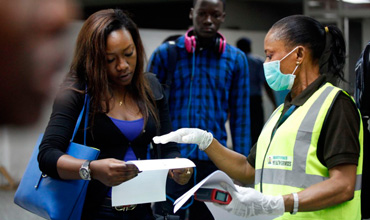Knowledge of Public Health Ethics among Medical Doctors in Nigeria

Abstract:
This study is about the level of knowledge
of medical practitioners in Nigeria on the principles of Public health ethics
and the existence of national code of health research ethics in Nigeria. It is
a cross-sectional questionnaire-based study in which 158 medical doctors were
involved. Data analysis of the study showed that one hundred and forty (140)
respondents completely filled and returned the Questionnaires, which represents
a response rate of 88.9%. One hundred and twenty seven (127) Respondents (90.7%)
claimed to have had medical ethics as part of their medical education. The
Median duration of formal education or exposure to public health ethics was 5
hours (range:0-20 hours). Eighty four (84) respondents representing 60% of the
respondents claimed to be aware of the body saddled with supervising of health
research ethics in Nigeria, but only forty seven (47) representing 33.8% of the
respondent were able to mention the name of the committee responsible for
medical ethics in Nigeria as the National Health Research Ethics Committee
NHREC). Sixty eight respondents (48.6%) have a good knowledge of public health
ethics. Analysis of the identified public health ethics dilemma shows that end
of life was the highest mentioned (77.1%) followed by discharge against medical
advice (61.4%) and confidentiality by 60% of the respondent. The study thus
concluded that there is obvious inadequacies in public health ethics knowledge
among Nigerian medical doctors, and a clarion call should be directed at policy
makers to overhaul the present medical education curriculum in Nigeria to
include public health ethics at both the undergraduate and post graduate
levels.
References:
[1.] Anand, S., Peter, F., & Sen,
A.,”Public health, ethics, and equity”. New York: Oxford University Press; 2004.
[2.] Abdullahi, V., & Pfizer, Inc. In:
S.D.N.Y; 2005.
[3.] Beauchamp & Childress.,
Principles Biomedical Ethics, OUP, 5th edition 2001.
[4.] Brogen, A, S., Rajkumari, B.,
Laishram, J., & Joy, A., Knowledge and attitudes of doctors on medical
ethics in a teaching hospital, Manipur. Indian J Med Ethics 2009;6:194-7. [PUBMED]
.
[5.] Cohen, J., “Roles and
Responsibilities: An Outline of Duties for Institution, IRB, Administrator, and
Investigator”. Prot Hum Subj, 2001:11-3.
[6.] Childress, J. F., Faden, R. R.,
Gaare, R. D., Gostin, L. O., Kahn, J., Bonnie, R. J., Kass, N. E., Mastroianni,
A. C., Moreno, J. D., & Nieburg, P,: Public health ethics: mapping the
terrain. J Law Med Ethics 2002.
[7.] Coughlin, S. S., Beauchamp, “TL:
Historical foundations. In Ethics and Epidemiology”. New York., Oxford University Press; 1996:5-23.
30:170-8. PubMed Abstract.
[8.] Coughlin, S. S., Soskolne, C. L.,
& Goodman, K. W “Case analysis and moral reasoning. In Case studies in
public health ethics”. Washington, DC: American Public Health Association;
1997:1-18.
[9.] Callahan, D., Jennings, B.,”Ethics
and public health: forging a strong relationship”. Am J Public Health 2002,
92:169-76. PubMed Abstract.
[10.]
De
Bruin, D. A., Scholder, S. L., Kahn, J., et. al., “Educational Approaches to
the Responsible conduct of Clinical Research: An Exploratory Study”. Acad Med,
2007; 82(1):32-9.
[11.]
Emanuel,
E. J., Wood, A., Fleischam, A., et al. “Oversight of Human Participants
Research: Identifying Problems to Evaluate Reform Proposals”. Ann Intern Med,
2004; 141(4):282-91.
[12.]
Emanuel,
E. J., Wendler, D., & Grady, C., “What Makes Research Ethical”. JAMA 2000;
283:2701-11.
[13.]
13.
Emanuel, E. J., Wendler, D., Killen, J., Grady, C., “What Makes Clinical
Research in Developing Countries Ethical?” The Benchmarks of Ethical
Research, JID 2004; 189:930-7.
[14.]
Eckles,
R. E., Meslin, E. M., Gaffney, M., & Helft, P. R., “Medical ethics
education: Where are we? Where should we be going? A review”. Acad Med
2005;80:1143-52.
[15.]
Fadare,
J. O., Desalu, O.O., Jemilohun, A.C., & Babatunde, O. A.,” Knowledge of
medical ethics among Nigerian medical doctors”. Niger Med J 2012;53:226-30.
[16.]
Ghersi,
D., Campbell, E. G., & Pentz, R., & Cox, Macpherson, C., “The Future of
Institutional Review Board”, Lancet Oncology, 2004:5:325-9.
[17.]
Goodyear-Smith,
F., Lobb, B., Davies, G., Nachson, I., & Seelau, S., “International
Variation in Ethics Committee Requirements: Comparisons Across Five Westernised
Nations”. BMC Medical Ethics, 2002;3:2.
[18.]
Hyder,
A. A., Wali, S. A., Khan, A. N., Theo, N. B., Kass, N. E., & Dawson, L.,
“Ethical Review of Health Research: A Perspective from Developing Country
Researchers”. J Med Ethics, 2004:30(1):68-72.
[19.]
Jones,
J., (1981). “ Bad Blood”. New York: The Free Press
[20.]
Lappe,
M., “Ethics and public health”. In Maxcy-Rosenau's public health and preventive
medicine . 12th edition. Edited by Last JM. Norwalk, CT: Appleton-Century-Crofts;
1986:1867-77.
[21.]
Last,
J. M., [ed]. “A Dictionary of Epidemiology”. Fourth Edition. 2000.
[22.]
Malakoff,
D., “Agency wants to stop Shopping for Best Deal”. Science, 2002; 296:1953.
[23.]
Masson.,
& Tiffany, T., “Public Health Ethics”: Establishing “Durable Solutions
Within the Global Polio Eradication Initiative in Nigeria 2009”. Independent
Study Project (ISP) Collection Page 720. http//digital
collections.sit.edu/isp-collectio.
[24.]
Ogundiran,
T. O., & Omotade, O. O., Bioethics in the medical curriculum in Africa. Afr
J Med Med Sci 2009;38:87-92. Goldie J. Review of ethics curricula in
undergraduate medical education. Med Education 2000; 34:108-19. Schonfeld TL.
“Reflections on teaching health care ethics on the web”. Sci Eng Ethics
2005;11:481-94. [PUBMED]
[25.]
Rugemalila,
J. B., & Kilam, W. I., “Proceedings of the Seminar on Health Research
Ethics in Africa”. Acta Tropica, 2001:78:S1-S126.
[26.]
Sugerman,
J., “The Role of Institutional Support in Protecting Human Research Subjects”.
Acad Med, 2000; 75(7):687-92.
[27.]
Wood,
A., Grady, C., & Emanuel, E. J., “Regional Ethics Organizations for
Protection of Human Research Participants”. Nature Medicine, 2004;
10(12):1283-8.
[28.]
Seiber,
J.,(2001). Laud Humphreys and the Tearoom Sex Study, retrieved from via http://web.missouri.edu
.
[29.] Shiraz, B., Shamim, M. S., Shamim, M. S., & Ahmed, A.,” Medical ethics in surgical wards: Knowledge, attitude and practice of surgical team members in Karachi”. Indian J Med Ethics 2005;2:94-6. PUBMED].

